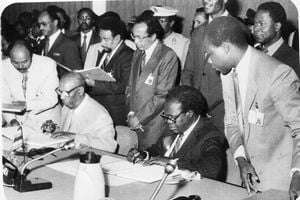
Ms Brenda Mulema ,CEO of Bake For Me. PHOTO/COURTESY OF BRENDA MULEMA
When Gerald Kisakye, a father of four, went to pursue his master’s degree in the United Kingdom, he wanted to create meaningful interactions and stay connected to his children beyond traditional communication methods.
Kisakye says this would remind his children that he was still part of their daily lives.
"I would record myself reading their favourite bedtime stories and send them voice notes. My wife would play these recordings every night, so they did not feel my absence as much," he recalls.
He admits that he struggled at first, relying only on occasional phone calls, which felt insufficient. "It was only when I started being more creative, such as sending photos and videos of myself doing everyday things, that made my children feel more engaged."
His daughter, Anna Kisakye, fondly remembers these moments.
"Even though dad was not around, hearing his voice at bedtime made me feel like he was still with us. It was comforting, and I would look forward to the stories every night."
It is not uncommon for many parents to leave home for extended periods due to work, education, or other commitments.
Whether they are pursuing higher studies abroad, working on contracts in neighbouring countries, or temporarily relocating for personal reasons, maintaining strong emotional connections with their children is a challenge that often causes deep concern.
While some parents succeed in nurturing bonds despite the physical distance, others face difficulties. Through personal stories and expert advice, we explored what parents can do to maintain closeness with their children while they are away.

Video calls have made communication easy for most parents who are distant from their families. Photo. FireFly Generated
Peter Tumwesigye, a counsellor, passionate about family wellbeing, advises parents to be intentional about staying present in their children’s lives.
"Use whatever technology is available—video calls, voice notes, or even handwritten letters. The key is to maintain a regular presence, so your children still feel connected to you."
Learn from mistakes
Not all parents find it easy to stay emotionally connected. After a few months of working in Rwanda, Ruth Nambubi, a mother who had left her four children with their aunt, found that when she left Uganda, her efforts to communicate were inconsistent.
"At first, I thought sending money home and ensuring they had everything they needed would be enough. But I noticed my children were becoming distant," Nambubi says.
She admits that it was a hard lesson for her to learn. The mother of four thought she was doing her best by providing, but she was neglecting the emotional connection they needed.
Nambubi eventually decided to return home, but she now encourages other parents to avoid the mistakes she made. "It is not just about providing; it is about being emotionally available, even when you are not physically present."
Daniel Kibira, Nambubi’s son, shares how he felt when his mother was away.
"At first, it was weird not having mum around, but after a while, I just got used to it. Sometimes I felt like we did not talk enough. Now that she is back, we talk more, and she is always checking on how I feel."
Understanding how children think and react
Tumwesigye explains that children of different ages react differently to a parent's absence. Younger children may become clingy or exhibit behavioural changes, while older children might feel resentment or act out in rebellion.
He emphasises the importance of understanding these emotional responses. "Parents must remember that it is natural for children to feel confused or upset when their routine is disrupted. Acknowledge their feelings instead of dismissing them."
Tumwesigye suggests several strategies parents can adopt for children of different ages. For younger children he encourages parents to incorporate games into their video calls or send them small gifts that remind them of their presence.
“You can also work with the caregiver to maintain some level of continuity in your absence—like sharing stories or meals over video calls,” she adds.
Even though teenagers tend to crave independence, Tumwesigye explains that they also need emotional support. Regular, meaningful conversations about their interests can help maintain that connection.
Listening and adapting
Robert Kiggundu and Amanya, parents of two children faced a unique situation when Amanya went to pursue studies in Canada for two years, leaving behind their two children.
"Initially, I was overwhelmed with guilt, I thought I was abandoning my children, but I knew this was an opportunity to secure a better future for them,” Amanya says.
Kiggundu shares, "At first, I struggled. I did not realise how much of the emotional work Amanya had been doing. But I had to step up and ensure the children felt supported. We had regular conversations about their feelings, and I made sure my wife was always involved in major decisions regarding their school and health."
Amanya points out that things did not always go smoothly. "I missed birthdays, and there were moments when I felt I was not doing enough. But we learnt to communicate better as a family, and my husband’s support was crucial."
Amanya and Kiggundu’s success lies in how they adapted as a couple, both acknowledging the challenges but finding ways to stay connected as a family.
For Amanya and Kiggundu's children, adjusting to their mother being away was a learning curve. "I missed having mum around for little things like cooking together or doing homework. But it helped that we still spoke to her regularly," their eldest son, Timothy Kiggundu, explains.
One father’s perspective
James Kiyingi, who spent three years in South Africa completing his PhD, shares a different perspective.
"I had to leave my family, but it was not just about me—it was about giving them a better future. I made sure to involve my children in the journey by explaining why I was away and how it would benefit them in the long run."
James admits there were times he felt detached from his children, especially during critical moments. "I missed my daughter’s graduation, and that was tough." However, he emphasised the importance of forgiveness and rebuilding. "When I came back, I made a concerted effort to be more involved in their lives. We talked about how they felt during my absence, and that openness helped us repair any emotional gaps."

Dr Rosemary Byanyima Kusaba, a mother of two, knew that travelling with her children who were in their formative years would not disrupt their studies that much. Photo/Geoffrey Mutumba
Prioritising the child-parent bond
Dr Rosemary Byanyima Kusaba, a mother of two, chose a different path. When she passed her Master’s degree from Makerere University, her supervisor recommended her for an apprenticeship in the United Kingdom where she would spend several months.
“Since my children were still young, I thought this was also an opportunity for them to travel. Leaving them behind also meant that I would have to inconvenience my relatives to come and take care of them,” Dr Byanyima shares.
Her decision was informed by the support that she was guaranteed as she pursued her research. She was staying with a family, which made it easy for her children to bond with others who they enjoyed school and leisure time with.
“By five o’clock I would be home and they had a big nursery garden with many species of fruits and plants. So, even me and my children, we enjoyed working with them in that garden,” Byanyima emphasises on their bonding.
Additionally, Byanyima knew that travelling with her children who were still in their formative classes would not disrupt their studies that much.
"There was adjustment for them—new schools, a new culture, and being away from their extended family. But I made sure we maintained a routine that felt familiar, like our Sundays where we would attend church together,” she recounts.
Having lost her husband when the children were in nursery school, Byanyima’s policy was that the parenting role was entirely hers, thus her work schedule rotated on how she could create time to be with her children.
Byanyima underscores support from extended family whenever she travelled for weeks. She would make arrangements on how her children would be taken care of.
“I had other travels like a three-week training in Nairobi. Another time I had to go to Italy for two months. When I was in Nairobi, my niece stayed with my children and when I went to Italy, she was already a graduate and I even left her with my car to drop off and pick them up from school for those two months,” Byanyima shares.
The medic notes that even though there was no internet then, she had a landline in her house where she would call any time and talk to her children, which strengthened their bond.
As for Brenda Mulema, the chief executive officer of Bake4Me, a mother who often travels for work-related issues, phone calls with her family members strengthen their bond.
“Even if it is my husband or another person abroad, we make time and do a video call and we pray,’ Mulema shares, adding that she respects her children and brings them anything they ask from her trips.
She says this makes them feel loved. Even though the gap of parents’ absence cannot be filled fully, Mulema notes that respecting children’s demands goes a long way in making them happy.
“Pay attention to those tiny little demands. If a child asks for anything that you can afford to bring do it,” she advises.




